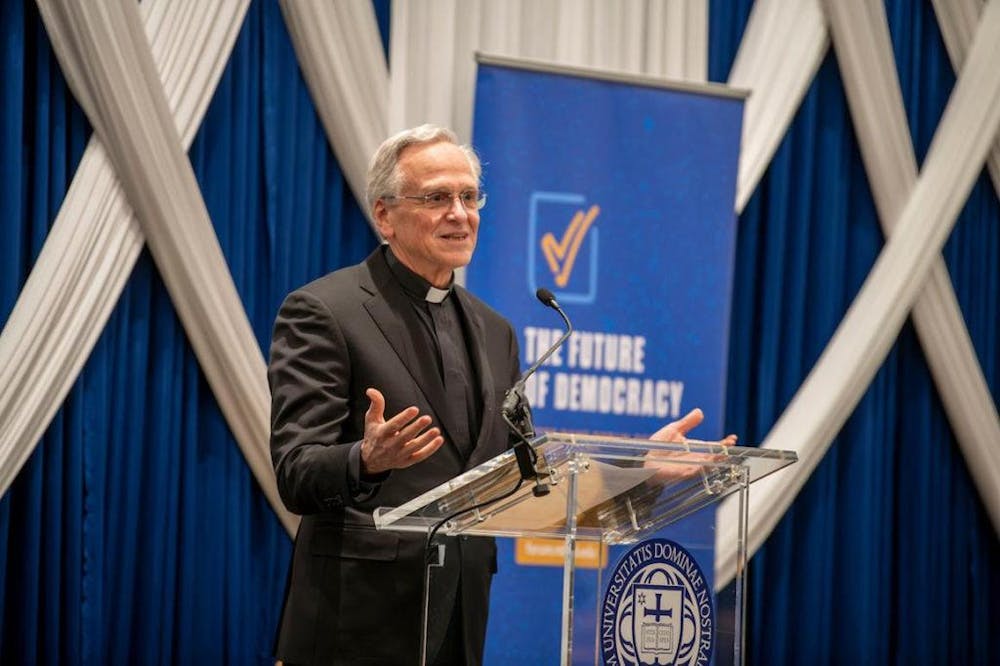As Fr. Jenkins ends his term as University President after nearly two decades, he has also been announced as this year’s Commencement speaker. Outgoing chair of the Notre Dame Board of Trustees Jack Brennan wrote in an email to the campus community that after being asked by the Board, Jenkins “agreed” to speak. Brennan also wrote: “We believe at this moment Father Jenkins’ leadership and exemplary service to the University make him a most fitting choice.”
While Fr. Jenkins’ leadership and service has certainly been impressive, we can hear — and have heard — from him whenever he so chooses.
As students on the verge of leaving Notre Dame, we want to hear from someone who lives out the University’s calling to be a force for good — but that does not mean they have to come from within the Golden Dome’s bubble. The commencement speaker we long to hear from is one who can speak with confidence about the challenges, joy and opportunities of life outside of Notre Dame.
While we respect the priest and academic who led our University for the last 19 years, dissatisfaction over the choice for commencement speaker is far from rare among the senior class.
The occasion of graduation — this margin between life under the Dome and life beyond it — befits a commencement speaker who can speak not only to the campus life of our past but also to the challenges of our future.
Fr. Jenkins has had ample opportunities to speak to the Class of 2024. He has often relayed the heavy decision made in 2020 to return to in-person classes amid a global pandemic. Those who attended the class of 2024’s Junior Parents Weekend festivities are all too familiar with that speech. Seniors have heard this noble message many times, and understandably so. For graduation, however, we’d like to be defined by more than our past.
That doesn’t mean we don’t want Fr. Jenkins to speak at graduation. In fact, we’d like to hear from him as our University President. But we also want to hear from a commencement speaker who actively lives as a force for good from beyond the Dome.
In the past, University presidents have spoken at Commencement Ceremonies, whether through introductions, invocations or closing remarks. Last year, Fr. Jenkins spoke directly to the Class of 2023 about Juan Manuel Santos, last year’s commencement speaker. Santos is a Nobel Peace Prize recipient and served as president of the Republic of Colombia from 2010 to 2018.
Jenkins called him a “courageous and visionary statesman [who] led his country through an arduous peace process.” Why invite Santos to speak, instead of someone internal to the University? In Jenkin’s own words, figures like Santos, “stand[s] as a beacon of hope to a world engulfed in deadly conflicts.”
There is value in hearing from someone outside Notre Dame because this place is temporary. Undergraduate education is a four-year stretch to help prepare you for the rest of your life. If the University has done its job well, its graduates will be eager to accomplish goodness in the wider world. So why not use this opportunity to invite someone who can draw on outside experience to inspire that eagerness?
History shows that there is no shortage of qualified candidates who would be honored to give such a speech. The list of previous Commencement speakers includes multiple U.S. Presidents, the UN Secretary General, Pulitzer-winning journalists, the U.S. Secretary of State, bishops, high-ranking judges and company executives.
Union General William Tecumseh Sherman spoke at the 1865 graduation. Former FBI Director J. Edgar Hoover spoke in 1942. Dwight D. Eisenhower spoke to the class of 1960. Jimmy Carter in 1977. Ronald Reagan in 1981. Condoleezza Rice in 1995. Kofi Annan in 2000. These are only a few of the laudable voices that have inspired past classes.
In light of this list, our question remains: Why not invite a speaker external to the University? Such an invitation does not preclude Fr. Jenkins from addressing the class of 2024.
At the very least, the lack of invitation to an external speaker is a missed opportunity. The commencement speaker used to serve as a testament to Notre Dame’s prestige of both academics and character. Perhaps today, we are too afraid of controversy to aspire to greatness.
As Brennan noted in his email, the selection is not typical. Fr. Hesburgh and Fr. Malloy never delivered a Commencement speech. Yes, we owe a tremendous amount of gratitude to Fr. Jenkins for allowing the Class of 2024 to have a freshman year. That’s important, but it’s only part of our college experience. There’s plenty of time to reflect back and allow the president to speak during the ceremony — but that time is not the Commencement speech.
As Fr. Jenkins steps down and the senior class prepares for graduation, we both look forward to the next chapters of our lives. The Commencement speech should do the same.










